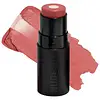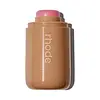What's inside
What's inside
 Key Ingredients
Key Ingredients

 Benefits
Benefits

 Concerns
Concerns

 Ingredients Side-by-side
Ingredients Side-by-side

Diisostearyl Malate
EmollientDimethicone
EmollientPolybutene
Synthetic Wax
AbrasiveCaprylyl Methicone
Skin ConditioningVinyl Dimethicone/Methicone Silsesquioxane Crosspolymer
Bis-Diglyceryl Polyacyladipate-2
EmollientHydrogenated Polyisobutene
EmollientPolyglyceryl-2 Triisostearate
EmulsifyingDimethicone/Vinyl Dimethicone Crosspolymer
Skin ConditioningAluminum Starch Octenylsuccinate
AbsorbentTriethylhexanoin
MaskingMagnesium/Potassium/Silicon/Fluoride/Hydroxide/Oxide
Caprylic/Capric Triglyceride
MaskingEthylene/Propylene Copolymer
AbrasiveSorbitan Isostearate
EmulsifyingCeresin
Emulsion StabilisingPhenoxyethanol
PreservativeOctyldodecanol
EmollientGlyceryl Caprylate
EmollientTocopherol
AntioxidantMicrocrystalline Wax
Emulsion StabilisingSilica
AbrasiveTriethoxycaprylylsilane
Dipentaerythrityl Hexahydroxystearate/Hexastearate/Hexarosinate
Skin ConditioningPolyhydroxystearic Acid
EmulsifyingSorbitan Sesquioleate
EmulsifyingSynthetic Fluorphlogopite
Euphorbia Cerifera Wax
Aluminum Hydroxide
EmollientStearalkonium Hectorite
Gel FormingPropylene Carbonate
SolventPentaerythrityl Tetraisostearate
EmollientGlycerin
HumectantButyrospermum Parkii Butter
Skin ConditioningTin Oxide
AbrasiveCeramide NP
Skin ConditioningPhytosphingosine
Skin ConditioningPalmitoyl Tripeptide-1
Skin ConditioningCI 77891
Cosmetic ColorantCI 15850
Cosmetic ColorantCI 77491
Cosmetic ColorantCI 77492
Cosmetic ColorantCI 77499
Cosmetic ColorantDiisostearyl Malate, Dimethicone, Polybutene, Synthetic Wax, Caprylyl Methicone, Vinyl Dimethicone/Methicone Silsesquioxane Crosspolymer, Bis-Diglyceryl Polyacyladipate-2, Hydrogenated Polyisobutene, Polyglyceryl-2 Triisostearate, Dimethicone/Vinyl Dimethicone Crosspolymer, Aluminum Starch Octenylsuccinate, Triethylhexanoin, Magnesium/Potassium/Silicon/Fluoride/Hydroxide/Oxide, Caprylic/Capric Triglyceride, Ethylene/Propylene Copolymer, Sorbitan Isostearate, Ceresin, Phenoxyethanol, Octyldodecanol, Glyceryl Caprylate, Tocopherol, Microcrystalline Wax, Silica, Triethoxycaprylylsilane, Dipentaerythrityl Hexahydroxystearate/Hexastearate/Hexarosinate, Polyhydroxystearic Acid, Sorbitan Sesquioleate, Synthetic Fluorphlogopite, Euphorbia Cerifera Wax, Aluminum Hydroxide, Stearalkonium Hectorite, Propylene Carbonate, Pentaerythrityl Tetraisostearate, Glycerin, Butyrospermum Parkii Butter, Tin Oxide, Ceramide NP, Phytosphingosine, Palmitoyl Tripeptide-1, CI 77891, CI 15850, CI 77491, CI 77492, CI 77499
Octyldodecanol
EmollientSynthetic Wax
AbrasiveHydrogenated Polyisobutene
EmollientCetyl Ethylhexanoate
EmollientPolyglyceryl-2 Triisostearate
EmulsifyingHydrogenated Poly(C6-14 Olefin)
EmollientBis-Diglyceryl Polyacyladipate-2
EmollientKaolin
AbrasiveSilica
AbrasiveMagnesium/Potassium/Silicon/Fluoride/Hydroxide/Oxide
Glycerin
HumectantCalophyllum Inophyllum Seed Oil
AntimicrobialPalmitoyl Tripeptide-1
Skin ConditioningPalmitoyl Tripeptide-5
Skin ConditioningCaprylyl Glycol
EmollientCaprylic/Capric Triglyceride
MaskingGlyceryl Caprylate
EmollientPentaerythrityl Tetraisostearate
EmollientAluminum Hydroxide
EmollientTriethoxycaprylylsilane
Water
Skin ConditioningPropylene Carbonate
SolventLauryl Polyglyceryl-3 Polydimethylsiloxyethyl Dimethicone
Skin ConditioningStearalkonium Hectorite
Gel FormingEthylhexylglycerin
Skin ConditioningCI 77891
Cosmetic ColorantIron Oxides
CI 45410
Cosmetic ColorantCI 42090
Cosmetic ColorantOctyldodecanol, Synthetic Wax, Hydrogenated Polyisobutene, Cetyl Ethylhexanoate, Polyglyceryl-2 Triisostearate, Hydrogenated Poly(C6-14 Olefin), Bis-Diglyceryl Polyacyladipate-2, Kaolin, Silica, Magnesium/Potassium/Silicon/Fluoride/Hydroxide/Oxide, Glycerin, Calophyllum Inophyllum Seed Oil, Palmitoyl Tripeptide-1, Palmitoyl Tripeptide-5, Caprylyl Glycol, Caprylic/Capric Triglyceride, Glyceryl Caprylate, Pentaerythrityl Tetraisostearate, Aluminum Hydroxide, Triethoxycaprylylsilane, Water, Propylene Carbonate, Lauryl Polyglyceryl-3 Polydimethylsiloxyethyl Dimethicone, Stearalkonium Hectorite, Ethylhexylglycerin, CI 77891, Iron Oxides, CI 45410, CI 42090
 Reviews
Reviews

Ingredients Explained
These ingredients are found in both products.
Ingredients higher up in an ingredient list are typically present in a larger amount.
Aluminum Hydroxide is a form of aluminum. It can be naturally found in nature as the mineral gibbsite. In cosmetics, Aluminum Hydroxide is used as a colorant, pH adjuster, and absorbent.
As a colorant, Aluminum Hydroxide may add opacity, or reduce the transparency. Aluminum hydroxide is contains both basic and acidic properties.
According to manufacturers, this ingredient is an emollient and humectant. This means it helps hydrate the skin.
In medicine, this ingredient is used to help relieve heartburn and help heal ulcers.
There is currently no credible scientific evidence linking aluminum hydroxide in cosmetics to increased cancer risk.
Major health organizations allow the use of aluminum hydroxide in personal care products and have not flagged it as a carcinogenic risk at typical usage levels.
Learn more about Aluminum HydroxideThis ingredient is lipid-based synthetic skin-conditioning agent derived from adipic acid and a mixture of fatty acids. It is often called a lanolin substitute.
As an emollient, it helps soften and hydrate the skin. Emollients create a barrier on the skin to trap moisture in.
Due to its fatty acid base, it may not be Malassezia folliculitis safe.
Learn more about Bis-Diglyceryl Polyacyladipate-2This ingredient is an emollient, solvent, and texture enhancer. It is considered a skin-softener by helping the skin prevent moisture loss.
It helps thicken a product's formula and makes it easier to spread by dissolving clumping compounds.
Caprylic Triglyceride is made by combining glycerin with coconut oil, forming a clear liquid.
While there is an assumption Caprylic Triglyceride can clog pores due to it being derived from coconut oil, there is no research supporting this.
Learn more about Caprylic/Capric TriglycerideCi 77891 is a white pigment from Titanium dioxide. It is naturally found in minerals such as rutile and ilmenite.
It's main function is to add a white color to cosmetics. It can also be mixed with other colors to create different shades.
Ci 77891 is commonly found in sunscreens due to its ability to block UV rays.
Learn more about CI 77891Glycerin is already naturally found in your skin. It helps moisturize and protect your skin.
A study from 2016 found glycerin to be more effective as a humectant than AHAs and hyaluronic acid.
As a humectant, it helps the skin stay hydrated by pulling moisture to your skin. The low molecular weight of glycerin allows it to pull moisture into the deeper layers of your skin.
Hydrated skin improves your skin barrier; Your skin barrier helps protect against irritants and bacteria.
Glycerin has also been found to have antimicrobial and antiviral properties. Due to these properties, glycerin is often used in wound and burn treatments.
In cosmetics, glycerin is usually derived from plants such as soybean or palm. However, it can also be sourced from animals, such as tallow or animal fat.
This ingredient is organic, colorless, odorless, and non-toxic.
Glycerin is the name for this ingredient in American English. British English uses Glycerol/Glycerine.
Learn more about GlycerinGlyceryl Caprylate comes from glycerin and caprylic acid, a fatty acid from coconut. It has emollient and emulsifier properties.
As an emollient, it helps hydrate your skin. Emollients work by creating a barrier on your skin to trap moisture in, helping to keep your skin soft and smooth.
On the other hand, emulsifiers prevent ingredients (such as oil and water) from separating.
Learn more about Glyceryl CaprylateHydrogenated Polyisobutene is a synthetic polymer. Polymers are compounds with high molecular weight. Hydrogenated Polyisobutene is an emollient and texture enhancer.
In one study, Hydrogenated Polyisobutene showed better skin hydration levels than Caprylic/Capric Triglyceride. As an emollient, it helps keep your skin soft and hydrated by trapping moisture in.
Hydrogenated Polyisobutene is often used as a mineral oil replacement.
Learn more about Hydrogenated PolyisobuteneWe don't have a description for Magnesium/Potassium/Silicon/Fluoride/Hydroxide/Oxide yet.
Octyldodecanol is a fatty alcohol. It is primarily used to enhance the texture of products.
As an emulsifier, Octyldodecanol helps prevent the oils and waters from separating. It also prevents ingredients from creating foam when shaken.
Octyldodecanol is created by reducing fatty acid to an alcohol.
Due to its high molecular weight, it does not get absorbed into the skin.
Learn more about OctyldodecanolPalmitoyl Tripeptide-1 is also known as pal-GHK. It is made up of 3 amino acids and palmitic acid, a fatty acid that helps it absorb into skin more easily.
This peptide is as a signal peptide, meaning it tells the skin to produce more collagen. Collagen is the key protein that helps form the skin's structure and keep it plump, firm, and hydrated.
By boosting collagen production, this ingredient supports a stronger skin barrier and helps reduce the appearance of wrinkles.
You'll most likely see this ingredient paired with Palmitoyl Tetrapeptide-7 in the well-known Matrixyl 3000 complex. While results from in-house testing should be viewed cautiously, this peptide duo is among the most studied and widely used in modern skincare.
Due to its palmitic acid base, this ingredient may not be safe for Malassezia folliculitis.
Read more about other common types of peptides here:
Learn more about Palmitoyl Tripeptide-1Pentaerythrityl Tetraisostearate is derived from isostearic acid. It is an emollient and emulsifier.
The highest concentration of this ingredient is found in lipsticks.
This ingredient is minimally water soluble and may not be Malassezia folliculitis, or fungal-acne safe.
Learn more about Pentaerythrityl TetraisostearateThis ingredient is a form of glycerin with emulsifying and emollient properties.
As an emulsifier, this ingredient helps keep products together while adding a thick texture. The manufacturer states this ingredient has emollient properties. Emollients help keep the skin hydrated by trapping moisture in.
Polyglyceryl-2 Triisostearate is created by reacting diglycerin and isostearic acid. Due to the isostearic acid base, it may not be safe for Malassezia or fungal acne.
Learn more about Polyglyceryl-2 TriisostearateThis ingredient is a solvent. It helps dissolve active ingredients and alter the texture of products.
Propylene Carbonate is commonly used in makeup and with clay, such as montmorillonite or bentonite.
Studies show this ingredient to be safe for cosmetics. When it is undiluted, it can cause skin irritation. (It is always diluted in skincare and makeup). This ingredient is water-soluble.
Propylene Carbonate is created from propylene glycol and carbonic acid.
Learn more about Propylene CarbonateSilica, also known as silicon dioxide, is a naturally occurring mineral. It is used as a fine, spherical, and porous powder in cosmetics.
Though it has exfoliant properties, the function of silica varies depending on the product.
The unique structure of silica enhances the spreadability and adds smoothness, making it a great texture enhancer.
It is also used as an active carrier, emulsifier, and mattifier due to its ability to absorb excess oil.
In some products, tiny microneedles called spicules are made from silica or hydrolyzed sponge. When you rub them in, they lightly polish away dead skin layers and enhance the penetration of active ingredients.
Learn more about SilicaStearalkonium Hectorite is a clay-derived ingredient used to thicken a product and help create a gel-like texture.
Synthetic Wax is created from fossil fuels such as natural gas. It is used to enhance texture, adjust pH, and as an occlusive.
It may also be used as an abrasive ingredient to exfoliate the skin.
Synthetic Wax may not be fungal acne safe.
Learn more about Synthetic WaxTriethoxycaprylylsilane is a silicone used to bind and stabilize ingredients.
As an emulsifier, it helps prevent ingredients from separating. This can help elongate the shelf life of products.
Triethoxycaprylylsilane is often used to coat mineral sunscreens ingredients to help give a better feel. It also helps reduce oxidative stress in sunscreens.
Learn more about Triethoxycaprylylsilane